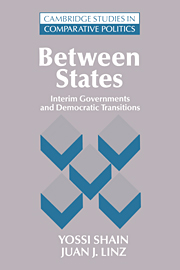Book contents
- Frontmatter
- Contents
- Preface
- Contributors
- PART ONE THEORY
- Introduction
- 1 Provisional governments: Revolutionaries and moderates
- 2 The power-sharing model
- 3 The caretaker government model
- 4 The international interim government model revisited
- 5 The timing and nature of first democratic elections
- 6 Conclusions
- PART TWO CASE STUDIES
- Index
6 - Conclusions
Published online by Cambridge University Press: 05 August 2012
- Frontmatter
- Contents
- Preface
- Contributors
- PART ONE THEORY
- Introduction
- 1 Provisional governments: Revolutionaries and moderates
- 2 The power-sharing model
- 3 The caretaker government model
- 4 The international interim government model revisited
- 5 The timing and nature of first democratic elections
- 6 Conclusions
- PART TWO CASE STUDIES
- Index
Summary
The reader at this point might ask what are the conclusions of our work that are relevant to the future of democracy in countries that have yet to undergo or complete a process of transition to democracy. It has not been our intention to make predictions but rather to draw the attention of scholars and politicians to the important questions of who governs in the interim period, with what authority, and how the governors use their power. We hope to have demonstrated how crucial interim governments are to the outcome of the transition and the character of the emergent polity.
Democracy is a way of governing a state, a political regime whose legitimacy stems primarily from the electoral procedure. The democratic procedure, as Robert Dahl reminds us, is not merely a process; it presumes the protection of specific rights – moral, legal, constitutional – that insures the procedure, including the freedoms of speech, press, and assembly, and the right to form opposition parties. Indeed, “that authoritarian rulers bend every effort to destroy all the institutions necessary to the democratic process demonstrates how fully aware they are that the democratic process is not ‘merely formal’ but would lead to structural transformation of their regimes.”
Undoubtedly there are, and probably always will be, nondemocratic systems with varying degrees of legitimacy that will be able to exercise effective control over people and territory.
- Type
- Chapter
- Information
- Between StatesInterim Governments in Democratic Transitions, pp. 92 - 124Publisher: Cambridge University PressPrint publication year: 1995

